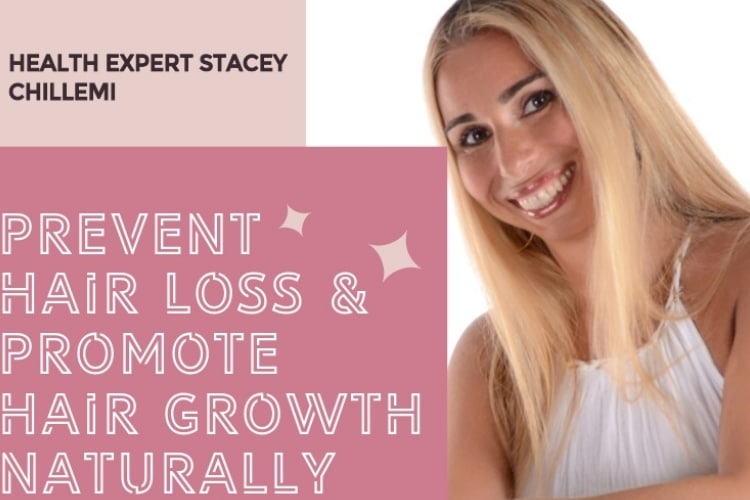
Profound Health Expert and Author Stacey Chillemi Discusses How Our Kids Can Thrive – Holistic Tips for Special Kids

Chava Burnham: Hi Stacey! Can you start by telling us a little about yourself?
Stacey Chillemi: Hi, My name is Stacey Chillemi and I am the author of the book, The Complete Guide to Natural Healing: A Natural Approach to Healing the Body and Maintaining Optimal Health Using Herbal Supplements, Vitamins, Minerals, Fruits, Vegetables and Alternative Medicine. My passion is helping others discover the surprising secrets to healing the body and maintaining excellent health for life. I have dedicated my life to the field of health, alternative medicine, and herbal medicine. My mission is to educate others and share with them the natural remedies to stay healthy, restore health, and look and feel younger.
I am an advocate for healing the body naturally and maintaining optimal health using herbal supplements, fruits, vegetables and alternative medicine, a way of life that does away with unnecessary medicines and over-the-counter drugs that pose a threat to our health in the long-run.

Some of my books in this area include The Complete Herbal Guide, Natural Cures for Common Conditions, The Secret To Happiness & Success: Master The Power Of Positive Thinking, Epilepsy You’re Not Alone, Epilepsy and Pregnancy and Live, Learn and Be Happy with Epilepsy which is about learning about your disorder and how to cope with it.
My new book, “Natural Remedies for Common Conditions which is about How to Prevent, Heal and Maintain Optimum Health is now available on Amazon, B&N and other online and retail bookstores.

WANT TO HEAL YOUR BODY NATURALLY? CLICK HERE.
Chava Burnham: Can you tell us how powerful herbal medicine and nutrition can be?
Stacey Chillemi: Here are some of my favorite supplements that are inexpensive and you can find in most kitchens
Table of Contents
BASIL
Basil can help relieve gas and soothe stomach upsets. One possible explanation for its calming effect is a compound called eugenol, which has been shown to help ease muscle spasms. Research is still preliminary, but laboratory studies also suggest that compounds found in basil may help disrupt the dangerous chain of events that can lead to the development of cancer.The humble herb and spice rack in your kitchen today need not be just a decorative feature, although they look quite pleasing to the eye hanging on the wall, in both modern and old fashioned styled homes. They can in fact hold a plethora of natural healing ingredients that can also add great taste to the foods you eat every day.
CAYENNE
Cayenne pepper is a hot red powder made from tropical chili peppers. It contains alkaloid capsaicin, which relieves pain by blocking the chemicals that send pain messages to the brain. If you eat cayenne at the first sign of any type of a headache, with plenty of water as a chaser, this spicy herb may be an effective alternative treatment. Added to food, cayenne perks up an appetite improves digestion and relieves gas, nausea, and indigestion. The herb also thins phlegm and eases its passage from the lungs, thus helping to prevent and treat coughs, colds, and bronchitis.
CINNAMON
Cinnamon bark contains an oily chemical called cinnamaldehyde that kills a variety of illness-causing bacteria, including the dreaded E.coli, Salmonella, and Staphylococcus aureas. Research shows that cinnamon is also able to stop the growth of the Asian flu virus. Herbalists report that cinnamon bark also helps regulate the menstrual cycle and checks flooding during menopause. Also, cinnamaldehyde has a tranquilizing effect that helps reduce anxiety and stress.
CLOVE
Oil of clove is 60 to 90 percent eugenol. It is a potent pain deadening antimicrobial. Clove has earned the official endorsement of the FDA as an effective stopgap measure for tooth pain. Clove is also among the spices that can help the body use insulin more effectively, thus lowering blood sugar somewhat. In one lab study, clove was also found to speed healing of the dreaded cold sores.
DILL
Dill has been used to soothe the digestive tract and treat heartburn, colic, and gas for thousands of years. In fact, the word dill comes from the Old Norse word dilla, meaning to lull or soothe. The herb has an antifoaming action that suggests why it might help break up gas bubbles. Like parsley, dill is rich in chlorophyll, which also makes it useful in treating bad breath.
FENNEL
Rich in volatile oils, fennel is what’s known as a carminative herb, meaning that it can ease bloating, gas pains, and digestive spasms in the small and large intestines. Fennel can also reduce bad breath and body odor that originates in the intestines. Women who are breastfeeding may find that fennel, which works in a way similar to the body’s hormones, increases milk flow.
GARLIC
Intact garlic cloves contain an odorless, sulphur-containing amino acid called alliin. When the garlic is crushed, alliin becomes allicin. Research shows that allicin helps lower cholesterol and blood pressure and also helps prevents blood clots. Garlic can also reduce the risk of developing atherosclerosis (hardening of the arteries). Compounds in this familiar bulb kill many organisms, including bacteria and viruses that cause earaches, flu and colds. Research indicates that garlic is also effective against digestive ailments and diarrhea. What’s more, further studies suggest that this common and familiar herb may help prevent the onset of cancers.
GINGER
When it comes to quelling the queasiness of motion sickness, ginger has no equal say herbalists. In fact, researchers have demonstrated that ginger beats dimenhydrate, the main ingredient in motion sickness drugs such as Dramamine, for controlling symptoms of seasickness and motion sickness. Ginger stimulates saliva flow and digestive activity, settles the stomach, relieves vomiting, eases pain from gas and diarrhea, and is effective as an anti-nausea remedy. This aromatic herb also helps lower cholesterol. Herbalists have also found it to be useful as a pain reliever.
MINT
Herbalists the world over use mint, as a premier stomach tonic, to counteract nausea and vomiting, promote digestion, calm stomach muscle spasms, relieve flatulence, and ease hiccups. Menthol, the aromatic oil in peppermint, also relaxes the airways and fights bacteria and viruses. Menthol interferes with the sensation from pain receptors, thus it may be useful in reducing headache pain. Scientific evidence suggests that peppermint can kill many kinds of micro-organisms, and may boost mental alertness. In one study, people who inhaled menthol said they felt as if it relieved their nasal congestion, although it didn’t increase their measurable air flow.
OREGANO
Oregano contains at least four compounds that soothe coughs and 19 chemicals with antibacterial action that may help reduce body odor. The ingredients in oregano that soothe coughs may also help un-knot muscles in the digestive tract, making oregano a digestive aid. This familiar spice also contains compounds that can lower blood pressure too.
PARSLEY
Diuretic herbs such as parsley prevent problems such as kidney stones and bladder infections and keep our body’s plumbing running smoothly by causing it to produce more urine. They also relieve bloating during menstruation. Also, there’s a reason for that parsley on the edge of the dinner plate, it’s not just there for fancy decoration; it’s an effective breath freshener because it contains high levels of chlorophyll.
ROSEMARY
Rosemary is one of the richer herbal sources of antioxidants, which have been shown to prevent cataracts, and contains 19 chemicals with antibacterial action that help fight infection. Traditionally used to ease asthma, this common culinary ingredient has volatile oils that can reduce the airway constriction induced by histamine, that chemical culprit of asthma and other allergy symptoms. Herbalists think that rosemary may also help ease breast pain by acting as a natural drying agent to fluid filled cysts.
SAGE
The oils found in sage are both antiseptic and antibiotic, so it can help fight infections. Sage is effective for symptoms of menopause, night sweats, and hot flashes, because of its estrogenic action and because its tannins can dry up perspiration. There’s also compelling evidence that sage may be of value to people with diabetes for whom the hormone insulin does not work as efficiently as it should. Lab studies indicate that sage may boost insulin’s action.
THYME
Thyme contains thymol, which increases blood flow to the skin. The warmth is comforting, and some herbalists believe that the increased blood flow speeds healing. Thyme relaxes respiratory muscles and is endorsed for treating bronchitis by Commission E, the expert panel that judges the safety and effectiveness of herbal medicines for the German government. Aromatherapists say that thyme’s scent is a mood lifter.
TURMERIC
Many clinical studies agree that curcumin in turmeric has anti-inflammatory effects, including a significant beneficial effect in relieving rheumatoid arthritis and carpal tunnel syndrome. Curcumin, which gives this spice its familiar yellow pigment, may also lower cholesterol. Turmeric is also packed with antioxidants, including vitamins A, C, and E, which have been shown to prevent cataracts.
Passed down to us by our forefathers and countless generations throughout the world, these 15 food additives and enhancers are just a selected few that are currently known to have medicinal and beneficial properties, yet represent the more commonly used. By including these herbs and spices into your daily cooking or diet on a regular basis, you will greatly enhance your quality of life, and reduce the need for those expensive, and often damaging pharmaceutical drugs.
3 Important Tips to Remember
Natural substances often work like drugs in the body, so remember:
Don’t assume it’s safe
Herbs are not regulated by the FDA for safety or efficacy. So search the label for a seal of approval from the USP (United States Pharmacopeia) or CL (Consumer-Lab.com), which indicates it has been approved by certified academic laboratories. For a fee, you can research particular products at ConsumerLab.com.
Talk with your doctor
It’s best to tell your doctor that you are considering supplements. Some herbs can interact with certain meds, including those for high blood pressure, diabetes, and depression, as well as blood thinners and even OTC drugs.
Don’t overdo it
More isn’t necessarily better—and could be dangerous. Always follow dosing instructions.
Chava Burnham: Is a daily vitamin necessary for kids?
Stacey Chillemi: Based on the findings of a Health Survey that was done, they found children do contain adequate amounts of most vitamins and minerals, with the notable exception of vitamin D and calcium. The report also found that nearly one-quarter of kids ages four to eight had inadequate intakes of calcium, while more than one-third of boys ages nine to 18 and more than two-thirds of girls of the same age weren’t getting enough of the bone-building mineral.
Additionally, the report expressed concern that children might not be meeting their needs for fiber, and that toddlers weren’t getting enough fat in their diets.
While most pediatricians agree that a parent’s first line of defense should be diet, parents acknowledge that their busy schedules make it hard for kids to get healthy meals. Make your best effort to avoid processed snacks and energy drinks (Which so many parents are doing).
One positive note is that in the last couple of years, health research has taken off, and doctors and the general public have learned a lot more about the importance of nutrients.
Only a small percentage of children eat 10 servings of fruit and vegetables a day, two to four cups of milk or another dairy, and two servings of fish a week. We’re trying to eat better diets, but the reality is, “most people cannot sustain it. They’re tired, they travel or they’re sick of fighting with their kids who are picky eaters.
Publicized as a preventative miracle vitamin for everything from cancer and diabetes to heart disease and multiple sclerosis, vitamin D is made naturally by the body through sun exposure. The problem is that we don’t get enough sun for eight months of the year, and in the summer, we cover our children in sunscreen. “Because of this sun phobia, people overdo it and kids don’t get their vitamin D. Many foods are fortified with vitamin D, such as milk, orange juice, and soy products, but unless you are super consistent, these foods aren’t enough on their own, so people turn to vitamins to help improve their vitamin deficiencies.
Important vitamins and nutrients kids need:
Chava Burnham: Can you give us some herbs that are safe for children who have problems with hyperactivity or other behavioral problems?
Stacey Chillemi: Here are some herbal remedies that are known to be safe for children.
Natural Remedies for ADD in Children
Natural remedies have been around for centuries to help a multitude of ailments. One of the most beneficial herbs for ADD is Maidenhair Tree (Ginkgo Biloba); it is derived from one of the oldest trees on earth and is extremely effective helping the brain to focus. Ginkgo biloba not only helps the brain to focus but also helps memory and knowledge retention- a regimented dose helps school children considerably. Another great herb is St. John’s wort; this herb relieves more ADD symptoms, such as depression, fear, anxiety, and insomnia.
Another natural remedy for ADD is chamomile, which helps to relax both mind and body. Chamomile can be taken in herb form or as a tea. A cup of chamomile tea, especially before bed, can greatly benefit anxious or restless children.
Foods to Help Children with ADD
While all kids need brain food in the morning, those with ADD especially need it to help them concentrate and focus even more. Children with ADD need to eat protein packed breakfasts such as granola, scrambled eggs, yogurt or even a fruit smoothie. Since recent studies have shown that allergies to milk products may increase the symptoms of ADD, both soy and rice milk are great substitutes.
In addition, research has also shown that sugars, colorings and preservatives aid in attention and concentration difficulties. Feeding your child a more balanced diet including raw veggies and fresh fruit will help with ADD symptoms. While cutting out additives from your child’s diet, try adding in omega-3 fatty acids, which can be found in salmon and walnuts.
Chava Burnham: What do you think about meditation and yoga for kids?
Stacey Chillemi: Meditation for children is an excellent holistic method that can improve a child’s life in various ways.
About Chava

If you have ever wondered about a connection to your children’s special needs, his or her diet, and lifestyle, you’re not alone. There are millions of parents all over the globe who have the same questions and problems that you run into daily. It’s time to change your life!
If your child (or children!) has ADHD, anxiety, is on the autism spectrum, has food allergies, out of control rage and anger, oppositional defiant disorder (ODD) or another behavioral problem, I want to help you. Your whole life doesn’t have to revolve around slamming doors, lies, screaming and fighting. You and your children deserve peace in your home and in your lives, and I can help you get there.
Here at Our Kids Can Thrive, my aim is to help parents with practical, nutritional and holistic tips that will have a real effect in your life. I want to help you change your life for the better. If you join the tribe, you can grab my FREE eBook, 12Foods That Will Change Your Child’s Behavior.






